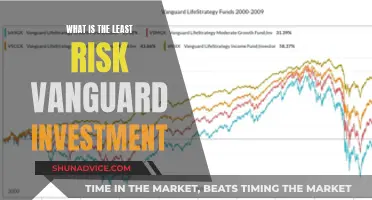
Exchange-Traded Funds (ETFs) are investment funds traded on stock exchanges, providing investors with a diversified portfolio. ETFs differ from mutual funds in their trading structure, as they are traded on stock exchanges like individual stocks. ETFs are considered to be fairly safe investments, as they carry fewer fees than other types of investments, provide a high level of transparency, and are more tax-efficient than comparable mutual funds. However, there are still risks involved with ETFs, including market fluctuations, tracking errors, liquidity challenges, and leveraged strategies. To mitigate these risks, investors can adopt strategies such as choosing ETFs with sufficient trading volumes and diversifying their ETF holdings across different asset classes.
| Characteristics | Values |
|---|---|
| Fees | Fewer fees than other types of investments |
| Transparency | High level of transparency |
| Tax efficiency | More tax-efficient than comparable mutual funds |
| Type of fund | Most ETFs are index funds |
| Risks | Market fluctuations, tracking errors, liquidity challenges, leveraged strategies |
What You'll Learn

ETFs are investment funds traded on stock exchanges
Exchange-traded funds (ETFs) are investment funds traded on stock exchanges, providing investors with a diversified portfolio. ETFs are considered fairly safe investments because most are index funds, which invest in the same securities as a given index, such as the S&P 500, and attempt to match the index's returns each year. However, like all investments, ETFs carry risk. ETFs are exposed to the full volatility of the market, meaning that if the index loses value, the fund will follow suit.
ETFs differ from mutual funds in their trading structure. Mutual funds are bought and sold through the fund company at the end of the trading day at the net asset value (NAV) price. In contrast, ETFs are traded on stock exchanges like individual stocks. This means that ETFs carry fewer fees than other types of investments and are more tax-efficient than comparable mutual funds.
There are several risks associated with ETFs, including market fluctuations, tracking errors, liquidity challenges, and leveraged strategies. To mitigate these risks, investors can adopt strategies such as choosing ETFs with sufficient trading volumes and diversifying their ETF holdings across different asset classes. It is also important to be mindful of how market conditions may impact the ETFs held. For example, if bad news comes out, there may be many people trying to sell the same ETF shares, which could affect the market price.
Overall, while ETFs are generally considered safe investments, it is important for investors to be mindful of the risks involved and take appropriate action to protect their investments.
EPS-Driven Investment Decisions: A Guide to Smart Investing
You may want to see also

ETFs carry fewer fees than other investments
Exchange-Traded Funds (ETFs) carry fewer fees than other investments. This is because they are traded on stock exchanges like individual stocks, rather than being bought and sold through the fund company at the end of the trading day at the net asset value (NAV) price. ETFs are also more tax-efficient than comparable mutual funds.
ETFs are investment funds traded on stock exchanges, providing investors with a diversified portfolio. However, there are a number of risks to ETFs, including market fluctuations, tracking errors, liquidity challenges, and leveraged strategies. To mitigate these risks, investors can adopt a number of strategies. Firstly, it is important to choose ETFs with sufficient trading volumes. Investors can also diversify their ETF holdings across different asset classes to avoid overconcentration.
Another way to stay safe is to be mindful of the risks and take appropriate action. For example, keep an eye on how market conditions may impact the ETFs you hold. If bad news comes out, be aware that there may be a lot of people trying to sell the same ETF shares.
Most ETFs are fairly safe because the majority are index funds. An indexed ETF is a fund that invests in the exact same securities as a given index, such as the S&P 500, and attempts to match the index's returns each year. While all investments carry risk and indexed funds are exposed to the full volatility of the market, the overall tendency of the stock market is bullish.
Investment Bankers vs Lawyers: Who Earns More?
You may want to see also

ETFs are more tax-efficient than comparable mutual funds
Exchange-traded funds (ETFs) are more tax-efficient than comparable mutual funds. ETFs are investment funds traded on stock exchanges, providing investors with a diversified portfolio. However, there are a number of risks to ETFs, including market fluctuations, tracking errors, liquidity challenges, and leveraged strategies.
ETFs differ from mutual funds in their trading structure. Mutual funds are bought and sold through the fund company at the end of the trading day at the net asset value (NAV) price, whereas ETFs are traded on stock exchanges like individual stocks. This means that ETFs are more liquid than mutual funds, which can be an advantage for investors who want to be able to buy and sell their investments quickly and easily.
ETFs are also more tax-efficient than mutual funds because they are structured as open-end funds. This means that they do not have to pay capital gains taxes when they sell securities, which can result in significant tax savings for investors. In addition, ETFs carry fewer fees than other types of investments and provide a high level of transparency.
However, it is important to note that not all ETFs are created equal. If investing safely is a top priority, it is generally recommended to stay away from smaller ETFs, as these funds may have lower trading volumes, making it more difficult for investors to execute trades without affecting the market price. To mitigate liquidity risk, investors can diversify their ETF holdings across different asset classes and choose ETFs with sufficient trading volumes.
Understanding Investment Management: A Comprehensive Guide
You may want to see also

ETFs are exposed to the full volatility of the market
Exchange-traded funds (ETFs) are exposed to the full volatility of the market. This means that if the index loses value, the fund will follow suit. However, the overall tendency of the stock market is bullish.
ETFs are investment funds traded on stock exchanges, providing investors with a diversified portfolio. There are a number of risks to ETFs, including market fluctuations, tracking errors, liquidity challenges, and leveraged strategies. For example, ETFs with lower trading volumes may make it more difficult for investors to execute trades without affecting the market price.
To mitigate these risks, investors can adopt a few strategies. Firstly, it is essential to choose ETFs with sufficient trading volumes. Investors can also diversify their ETF holdings across different asset classes to avoid overconcentration. Additionally, investors should keep an eye on how market conditions may impact their ETFs; for example, if bad news comes out, there may be an abundance of people trying to sell the same ETF shares.
Despite the risks, ETFs can be safe investments if used correctly. Most ETFs are actually fairly safe because the majority are index funds. An indexed ETF is a fund that invests in the exact same securities as a given index, such as the S&P 500, and attempts to match the index's returns each year.
Consensys Ventures: Exploring India's Blockchain Potential
You may want to see also

ETFs have lower trading volumes than other funds
Exchange-traded funds (ETFs) are investment funds traded on stock exchanges, providing investors with a diversified portfolio. ETFs are considered fairly safe investments because the majority are index funds. An indexed ETF is a fund that invests in the same securities as a given index, such as the S&P 500, and attempts to match the index's returns each year.
However, ETFs do carry some risks, including market fluctuations, tracking errors, liquidity challenges, and leveraged strategies. One of the risks associated with ETFs is their lower trading volumes compared to other funds. Lower trading volumes can make it more difficult for investors to execute trades without affecting the market price. This is especially true for smaller ETFs.
To mitigate liquidity risk, investors can adopt several strategies. Firstly, it is essential to choose ETFs with sufficient trading volumes. Diversifying ETF holdings across different asset classes can also help avoid overconcentration. Additionally, investors should keep an eye on how market conditions may impact their ETF holdings. For example, bad news about a particular ETF may lead to many people trying to sell their shares, affecting the market price.
While ETFs have lower trading volumes than other funds, this does not necessarily make them unsafe investments. By being mindful of the risks and taking appropriate action, investors can still safely invest in ETFs.
Understanding Your Personal Investment Risk Tolerance
You may want to see also
Frequently asked questions
ETFs are investment funds traded on stock exchanges, providing investors with a diversified portfolio. ETFs are generally considered to be fairly safe, but they do carry some risks, including market fluctuations, tracking errors, liquidity challenges, and leveraged strategies.
As with any investment, there are risks involved with ETFs. These include market fluctuations, tracking errors, liquidity challenges, and leveraged strategies. It's important to be mindful of these risks and take appropriate action to mitigate them.
There are a few strategies investors can adopt to mitigate risk when investing in ETFs. Firstly, choose ETFs with sufficient trading volumes. Secondly, diversify your ETF holdings across different asset classes to avoid overconcentration. Lastly, keep an eye on how market conditions may impact your ETFs; for example, if there's bad news, be aware that many people may be trying to sell the same ETF shares.







